The Final Call: Continuing a tradition as a trailblazer in news reporting and analysis
By FinalCall.com News | Last updated: Jan 22, 2014 - 11:51:40 PMWhat's your opinion on this article?
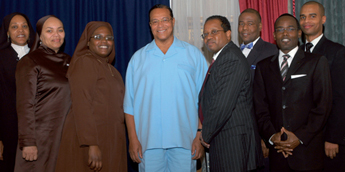
(L-R) Jennifer Muhammad, Marcella X, Starla Muhammad, Minister Louis Farrakhan, Richard Muhammad, Nathan Muhammad, Ashahed M. Muhammad and Timothy 6X are shown in this 2013 staff photo.
|
Founded and personally financed by Min. Farrakhan in 1979, the paper was launched on the faith and power of the message of his teacher, the Most Honorable Elijah Muhammad.
The entire first edition of the paper, except for the Honorable Elijah Muhammad’s editorial and presentation of “The Muslim Program,” was written by Min. Farrakhan. Members of his family, particularly his daughter Donna, and others, including Chuck Green and Melala Archibald, designed the layout, did the typesetting, copy editing, and assisted in the research.
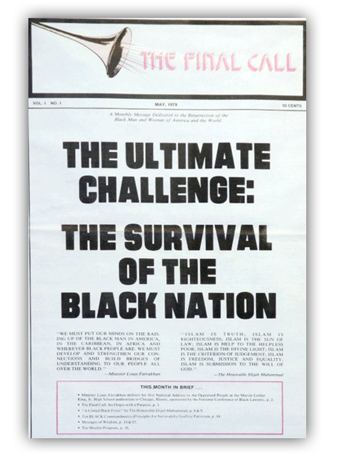
Volume 1 number 1 of The Final Call, Published in May of 1979
|
The paper, dedicated to the resurrection of the Black man and woman of America and the world, emerged with its first headline, “The Ultimate Challenge: The Survival of the Black Nation.”
“In 1972, the Honorable Elijah Muhammad spoke with Minister Louis Farrakhan and said, ‘Brother, I don’t like to talk about this because it gives me great pain, but the Nation is going to take a dive for the second time,’ ” The Final Call stated in an editorial.
“When the Messenger saw the pain in Minister Farrakhan’s face, he comforted him by saying, ‘But don’t worry, brother. It will be rebuilt, and it will never fall again.’ It was from time to time that he kept saying to Minister Farrakhan, ‘Go exactly as you see me go and do exactly as you see me do. Now, Brother, you can preach this word as strongly as you see me preach it. But, you must go according to the way I go … meaning that you must practice righteousness or they (the enemy) will piece you in two.’
“In rebuilding the Nation of Islam, it is incumbent upon us to retrace the Honorable Elijah Muhammad’s steps,” the paper noted. “The first newspaper that the Messenger produced was in 1934 after His Teacher Master Fard Muhammad had left Him with the Mission. The name of that paper was The Final Call To Islam.

|
“So, as He began, we begin! THE FINAL CALL is a monthly message published by people dedicated to the resurrection of the Black man and woman of America and the world …”
With the publication of the fourth edition, the paper, edited by Godfrey X Patterson, and a graduate student of theology at Howard University, began to include writers other than members of the Nation of Islam, among them being Haki Madhubuti, the distinguished writer and educator, and Lu Palmer, the legendary Black journalist.
Black women, a central component of the Minister Farrakhan’s rebuilding effort, were represented by Roberta Muhammad’s contribution, “The Resurrection.”
By 1981, a special Saviour’s Day edition was published carrying the headline, “The Rebirth of a Nation,” and subtitled, “A Saviour is Born for the Black Man and Woman of America.” This historic paper featured Minister Farrakhan’s edited remarks from the Nation of Islam’s first Saviour’s Day address of the so‑called “Second Resurrection.”
As Volume 2 emerged, the editorial mantle of leadership passed from Minister Godfrey X Patterson to Askia Muhammad, who was the Hon. Elijah Muhammad’s first Muslim editor of the legendary Muhammad Speaks newspaper.
By 1982, The Final Call emerged from its basement office in the home of Minister Farrakhan to its new home on West 79th Street in Chicago. Christened “The Final Call Administration Building,” Minister Farrakhan opened headquarters on Sept. 12, 1982.
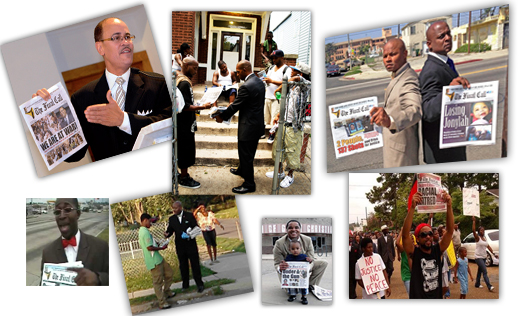
|
The Abdul Wali Muhammad Years
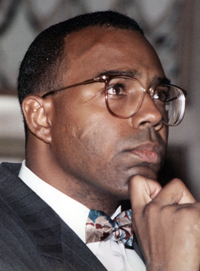
Abdul Wali Muhammad
|
Given Min. Abdul Allah’s formal education in journalism from the historic Howard University, he brought a new level of professionalism to The Final Call and kept the publication steady for several years under his leadership. Assisting Min. Abdul Allah was Min. Abdul Wali Muhammad (1954-1991), who had just arrived at the Nation of Islam’s Chicago headquarters in 1982.
Minister Abdul Wali Muhammad assumed the post of editor-in-chief in 1984 and introduced a higher level of technology to The Final Call, particularly utilizing personal computers to automate every department, and utilizing state-of-the-art equipment in the production department.
Because Min. Farrakhan’s media outreach extended chiefly through the newspaper, Bro. Wali made The Final Call the tie that bound Black America together. Indeed, circulation greatly increased during his years at the helm. The Final Call’s coverage of Min. Farrakhan—who was then a major media topic and would become even more so—was crucial in bringing clarity and truth to the distortions in the mainstream media about his message for years to come.
The year 1991 ended with the passing of Editor-in-chief Minister Abdul Wali Muhammad, at the age of 37 on Dec. 26, 1991. “The Nation mourns the passing of one of its brightest stars, Minister Abdul Wali Muhammad,” Minister Farrakhan said. “His brilliant mind reflected in his speech and in his pen will be greatly missed among us. I personally have lost a brother, a companion, a friend and a son in the most difficult of all endeavors, the transformation of the lives of our people here and throughout the world. I thank Allah (God) for the privilege and honor of having known him. His memory shall be with me to my dying day and his work shall endure in the history of the Nation of Islam.”
Indeed, The Final Call’s Abdul Wali Muhammad years were extraordinary to say the least. The Nation of Islam’s rapid rebuilding and popularity was authoritatively captured in the pages of The Final Call.
Rise, You Mighty Nation, Rise!
Under the guidance of Min. Farrakhan, Bro. Wali’s assistant, James G. Muhammad, would carry the journalistic torch of The Final Call to new heights as he assumed the post of Editor-in-chief in January 1992.
Keeping in tune with Bro. Wali’s desire to stay on the cutting edge of technology, Bro. James and his staff expanded use of computer-based technology, able to produce every facet of the paper in-house, except the actual printing of the paper, which will be a reality in the near future.
The Final Call Online Edition was initially started as a simple promotional tool developed by Nation of Islam college students for the historic Million Man March in 1995. Receiving millions of visits since its inception, it has grown into the online companion to The Final Call Newspaper.
Following in that great tradition of the Nation of Islam's publications, The Final Call Online Edition aims to serve as an essential source of information for those who thirst for uncompromised reporting in today's arena of corporate driven media.
On April 16, 1996, The Final Call announced, the newspaper began its weekly publication schedule. “Following the legacy of the Muhammad Speaks newspaper, published by the Honorable Elijah Muhammad, we plan to maintain and, in fact, increase our standard of excellence in bringing information to the Black community.”
Today, the weekly Final Call Newspaper serves a readership of diverse economic and educational backgrounds, including circulation in North America, Europe, Africa and the Caribbean.
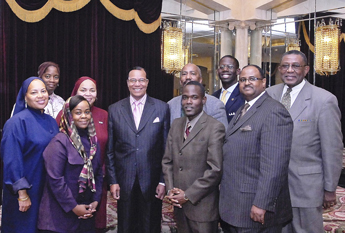
The Honorable Minister Louis Farrakhan (center) photographed in 2008 with the Final Call Newspaper's editors and staff writers. (l-r Nisa Islam Muhammad, Nubian Muhammad (front) Charlene Muhammad (back) Marcella Muhammad, Ashahed M. Muhammad, Abdul Arif Muhammad and Askia Muhammad (front) Saeed Shabazz and Jesse Muhammad (back).
|
Now subscribers can read each week's edition of The Final Call anytime, anywhere on their computer, tablet, or smartphone. The Final Call Digital Edition is the same complete edition as the print version with additional interactive features!
The Final Call uses state-of-the-art production technology and its content offers readers in-depth original reporting and news analysis. No other newspaper in the country tackles the most controversial issues as aggressively as The Final Call.
Related news:
Death Row Inmate: "The Final Call newspaper helped to save my life" (FCN, 03-29-2010)
Muhammad Speaks, a trailblazer in the newspaper industry (FCN, 03-10-2000)
INSIDE STORIES AND REVIEWS
-
-
About Harriett ... and the Negro Hollywood Road Show
By Rabiah Muhammad, Guest Columnist » Full Story -
Skepticism greets Jay-Z, NFL talk of inspiring change
By Bryan 18X Crawford and Richard B. Muhammad The Final Call Newspaper @TheFinalCall » Full Story -
The painful problem of Black girls and suicide
By Charlene Muhammad -National Correspondent- » Full Story -
Exploitation of Innocence - Report: Perceptions, policies hurting Black girls
By Charlene Muhammad -National Correspondent- » Full Story -
Big Ballin: Big ideas fuel a father’s Big Baller Brand and brash business sense
By Bryan Crawford -Contributing Writer- » Full Story






 Click Here Stay Connected!
Click Here Stay Connected!








